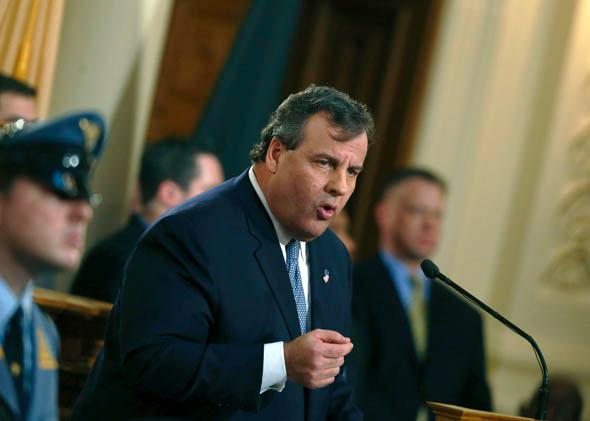Chris Christie, who punches when he should shove and shoves when he should wink, has had a long and successful career as a bully. The Fort Lee bridge scandal has almost certainly brought that to an end. “Embarrassed and humiliated,” Christie is now pretending that he never coerces, punishes, or leans his heavy hand on fellow politicians. And post-Bridgeghazi, he will actually have to govern that way.
Christie can’t be Christie anymore. That’s because, after you scrape away the thick layers of Democratic gloating, conservative schadenfreude, and media glee, there is general agreement that what the New Jersey governor and his people have been doing is deplorable. He’s already apologized abjectly for the George Washington Bridge lane closures. New reports suggest Christie and his top officials also canceled meetings with Jersey City’s Democratic Mayor Steve Fulop after Fulop declined to endorse Christie’s re-election bid this summer. Good-government types have greeted each new revelation with a sigh of satisfied disappointment. Oh, the gambling that goes on here in Casablanca!
Having governed by intimidation, punishment, cronyism, patronage, and legal forms of corruption, Christie is now unmanned. He has renounced Satan and all his works, given up his ability to kneecap and to bribe.
And that’s a shame, because Chris Christieism is not the main problem with American politics these days, or even a problem at all. American politics is a broken horror, particularly at the national level, not because politicians are too dirty, but because they’re not nearly dirty enough. Children need to eat dirt to develop immunological resistance that protects them from allergies and disease as they grow up. Something similar is true in politics: Minor forms of corruption—votes bought with earmarks, traded favors—create a political flexibility that keeps the entire system from collapsing in moments of crisis.
But excessive hygiene is rampant in Washington. The controlling conservative wing of the Republican Party is addicted to principle. If politics is the art of compromise, we have a huge number of elected officials who are not politicians at all but rather zealots animated by ideology. This consistency, so admirable in a campaign ad, makes governing and legislation nearly impossible.
A case in point is the House ban on earmarks, a proud achievement of the Boehner majority for the past four years. Grubby and inefficient, earmarks decorate the country with misplaced bridges and idiotic museums. But evidence suggests they also make political compromises possible. The less than 1 percent of federal spending that went to earmarks bought goodwill and dealmaking that lubricated Washington. Earmarks—a bribe, essentially—gave politicians cover to vote against their political interests, in support of someone else’s agenda. Think of President Obama buying support for his stimulus with a $10 billion pet project for Arlen Specter, or LBJ’s entire quid pro quo presidency. On the flip side: The earmark ban made it impossible for Democrats to buy enough votes to pass last year’s gun bill.
Democrats and Republicans rail about the corruption of Washington, about backroom deals and “Chicago-style” politics. But there are no backrooms anymore, just green rooms. And we should be so lucky to have Chicago-style politics in D.C. Instead we have a gritty political system, one without tools to do much of anything.
And that’s why Christieism seemed the cure, not the disease. Political machines made some American cities work (with an asterisk) for a century. The machine style still animates some cities and states, most visibly Rahm Emanuel’s Chicago. The premise of Chris Christie’s presidential campaign is that he would bring New Jersey–style politics to Washington. The generous interpretation of that: He has an ability to work with Democrats in New Jersey, so he would do the same in Washington. The reality: He has an ability to work with Democrats in New Jersey because he’s willing to bribe, mug, and hug them to get what he wants, so wouldn’t it be nice if he could do the same in Washington?
Bridgeghazi is frustrating because it suggests Christie actually isn’t an effective practitioner of kneecap politics. The closing of the George Washington Bridge lanes was so stupid, so heavy-handed, so public. They got caught! Christie and his people have given a bad name to a kind of politics that Americans should crave. In an excellent piece about Christie’s failure, David Simon compares the New Jersey governor to former Maryland Gov. William Donald Schaefer. “[Schaefer] might play every all-in-the-game political angle to reward friends and harm adversaries and take pride in the result. He would not, however, snarl some Maryland traffic purposely, endangering residents of his state, to achieve the most petty kind of payback. He wouldn’t purposely set his state’s performance back for a petty and vicious comeuppance.”
Some political systems, such as the incorruptible and efficient Scandinavian ones, can thrive without “dirty hands.” But ours can’t. In a country as diverse, unequal, and divided as the United States, citizens disagree about how to build roads, levy taxes, and educate children, and so do the people they elect to represent them. Legalized bribery—a judgeship for my low-IQ college roommate in exchange for a vote for your dumb charter school plan—helps keep it all going (and legalized punishment: Vote for my dumb charter school plan, or we start investigating your roommate’s “business”).
Petty corruption isn’t necessarily in the public interest. Not every act of political thuggery is in the service of passing the Civil Rights Act. Christie, in particular, seems to have doled out punishment for political reasons, rather than in pursuit of major policy goals.
But done right, corruption helps create a government that gets things done. Americans aspire to clean politics. But clean politics has given us a national government that doesn’t work. We need to get a little bit grubbier.
